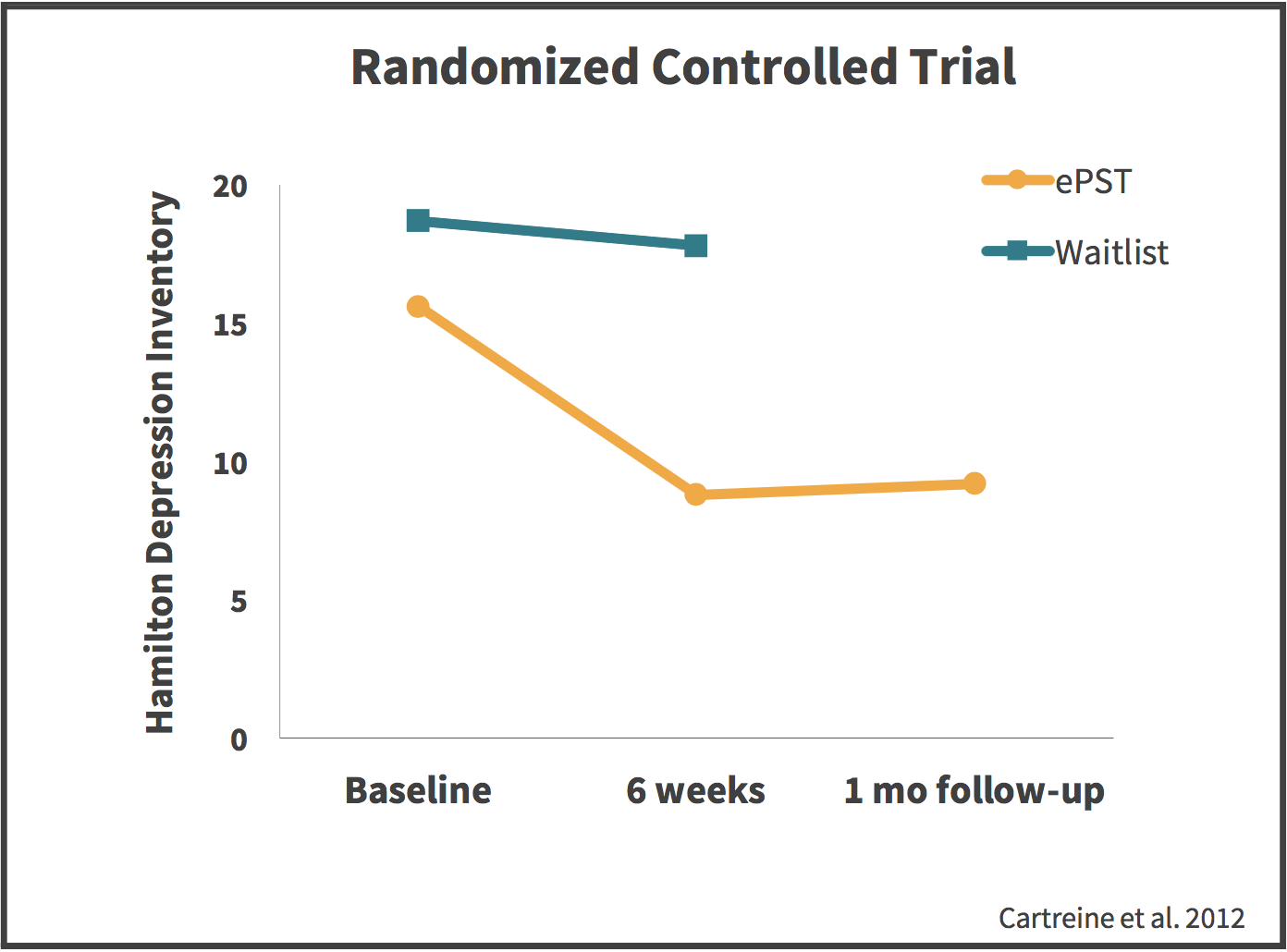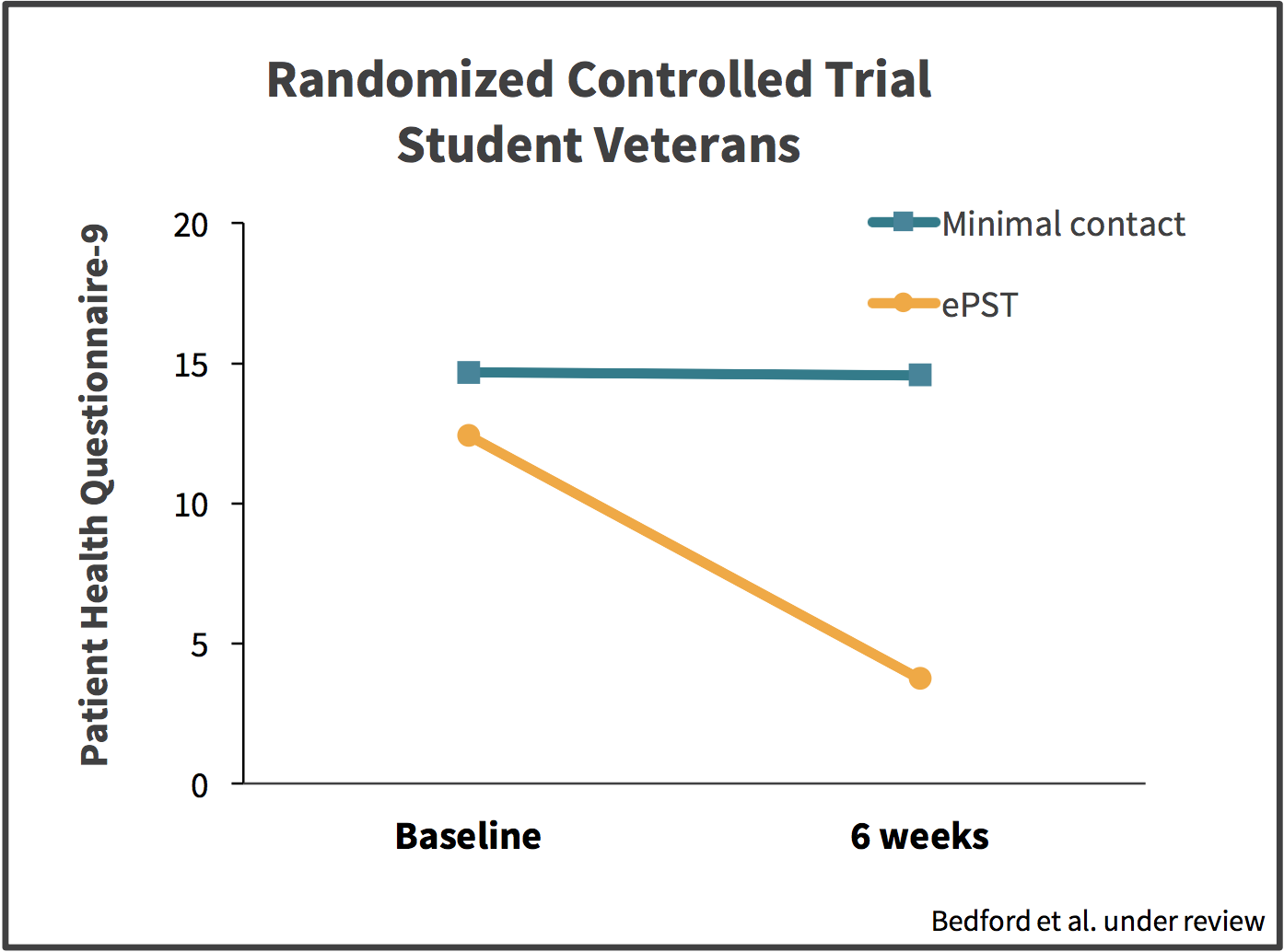Research on ePST®, together with extensive data supporting live problem-solving therapy, indicates that ePST can effectively treat depression.
Users Respond Favorably to ePST
Five clinical studies of ePST resulted in an overall 49.6% reduction in depression. Users readily accept and respond favorably to this form of treatment delivery. ePST facilitates a therapeutic bond nearly equivalent to live therapy.

Engaging, acceptable, and reduces depression
In a small randomized controlled trial at Beth Israel Deaconess Medical Center (BIDMC), participants found ePST to be a highly usable, acceptable, and credible means of receiving problem-solving treatment. All participants randomized to ePST completed all 6 treatment sessions and showed improvement in depressive symptoms.

Works as well as LIVE therapy
In a subsequent trial at Dartmouth-Hitchcock Medical Center (DHMC), 23 completers of ePST showed reductions in depression comparable to results of problem-solving treatment delivered by live therapists.

87% Remission
After using ePST, diagnosis of major depressive disorder dropped from 80% to 11% of the sample in the DHMC study. The completion rate was 80%.

Effectively treats depression
In a third study, also at BIDMC, participants randomized to ePST showed significantly greater improvement in depression than those in the waitlist group. Of the 25 participants randomized to ePST, 100% completed treatment.

Student Veterans
A study of student veterans at the University of North Texas found that ePST produced significant reductions in symptoms of depression, posttraumatic stress disorder, and insomnia.

Older Adults
A pilot trial showed that ePST was feasible with older adults and produced meaningful reductions in depression symptoms.
These trials, together with the extensive research on live PST as a therapy for depression, indicate that ePST can effectively treat depression, and that users readily accept and respond favorably to this form of treatment delivery.
Many Thanks to Our Research Partners
Jason M. Holland, PhD, University of Nevada Las Vegas: ePST for Geriatric Depression.
Daniel J. Taylor, PhD, CBSM, ABSM, University of North Texas: ePST for Student Veterans.
Luis Sandoval, PhD, Beth Israel Medical Center
We welcome additional research partners, please contact us for more information.
Publications
Bedford, L.A. et al., Computer-guided Problem-Solving Treatment for Depression, PTSD, and Insomnia Symptoms in Student Veterans: A Pilot Randomized Controlled Trial, Behav Ther (2017), doi 10.1016/j.beth.2017.11.010.
Sandoval, L.R. et al., 2017. Randomized Controlled Trial of a Computerized Interactive Media-Based Problem Solving Treatment for Depression. Behav Ther, 48, 413-425.
Berman, M.I. et al., 2014. Feasibility Study of an Interactive Multimedia Electronic Problem Solving Treatment Program for Depression: A Preliminary Uncontrolled Trial. Behav Ther, 45, 358– 375.
Cartreine, J.A. et al., 2012. Electronic Problem-Solving Treatment: Description and Pilot Study of an Interactive Media Treatment for Depression. JMIR Research Protocols, 1, e11.
Cartreine, J.A. et al., 2012. Using Self-guided Treatment Software (ePST) to Teach Clinicians How to Deliver Problem-solving Treatment for Depression. Depression Research and Treatment, 2012, article ID 309094, 1-11.
Cartreine, J.A. et al., 2010. A Roadmap to Computer-based Psychotherapy in the United States. Harvard Review of Psychiatry, 18(2), 80-95. Related publication.
Carter, J.A. et al., 2005. An Interactive Media Program for Managing Psychosocial Problems on Long-Duration Spaceflights. Aviat Space Environ Med. 76(6 Suppl):B213-23. Related publication.
Holland, J. et al., in preparation. Electronic Problem-solving Treatment for Late Life Depression: A Pilot Study.
